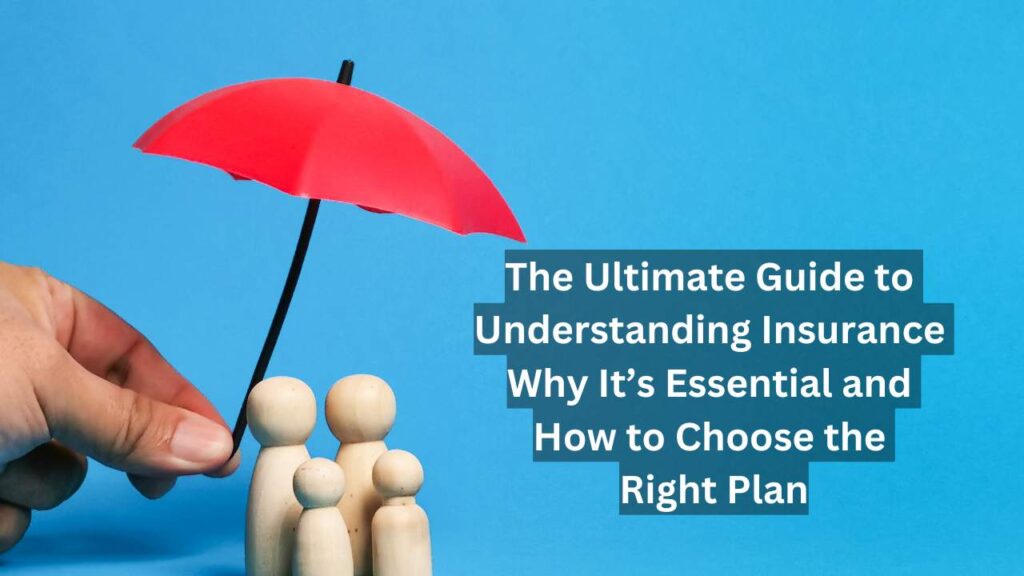Insurance is a financial safety net that protects you, your family, and your assets from unexpected events. Whether it’s health, life, auto, or home insurance, having the right coverage can provide peace of mind and financial stability. However, many people find insurance complex and confusing. In this guide, we will break down everything you need to know about insurance, why it’s essential, and how to choose the best policy for your needs.

Why is Insurance Important?
Life is unpredictable, and emergencies can arise at any time. Insurance helps mitigate risks by covering financial losses when unforeseen circumstances occur. Here are some key reasons why insurance is crucial:
- Financial Protection – Insurance helps cover unexpected expenses like medical bills, car accidents, or property damage, reducing financial burdens.
- Peace of Mind – Knowing that you are financially protected in case of emergencies allows you to live with less stress.
- Legal Requirements – Some types of insurance, such as auto insurance, are legally required in many countries.
- Investment and Savings – Some insurance policies, like life insurance and annuities, offer long-term financial growth and savings benefits.
Types of Insurance
There are various types of insurance to cover different aspects of life. Here are the most common ones:
1. Health Insurance
Health insurance covers medical expenses, including doctor visits, hospital stays, surgeries, and prescription drugs. It ensures that you get the necessary medical treatment without worrying about high costs.
Key Benefits:
- Covers hospitalization and treatment costs
- Provides preventive care services
- Helps manage chronic illnesses with ongoing care
2. Life Insurance
Life insurance provides financial support to your beneficiaries in case of your untimely death. There are two main types:
- Term Life Insurance – Provides coverage for a specific period and pays a death benefit if the insured passes away during the term.
- Whole Life Insurance – Offers lifetime coverage and accumulates cash value over time.
Key Benefits:
- Financial security for dependents
- Can be used as an investment tool (for whole life policies)
- Covers funeral and other final expenses
3. Auto Insurance
Auto insurance protects you financially in case of car accidents, theft, or damage. It typically includes liability coverage, collision coverage, and comprehensive coverage.
Key Benefits:
- Pays for repairs and medical expenses after an accident
- Covers legal liabilities if you’re at fault in an accident
- Offers protection against theft and vandalism
4. Homeowners/Renters Insurance
This type of insurance covers damages to your home or personal belongings due to disasters, theft, or accidents.
Key Benefits:
- Covers damage from fire, natural disasters, and theft
- Provides liability coverage if someone is injured on your property
- Protects personal belongings, even when traveling
5. Business Insurance
Business insurance helps protect companies from financial losses due to lawsuits, property damage, or employee-related risks.
Key Benefits:
- Covers legal fees and settlements
- Protects business assets from unforeseen damages
- Provides employee benefits like health insurance
How to Choose the Right Insurance Policy
Selecting the best insurance policy depends on several factors. Follow these steps to ensure you get the right coverage:
1. Assess Your Needs
Determine what kind of coverage you need based on your lifestyle, financial situation, and risk factors. For example, a young professional might prioritize health and auto insurance, while a parent might focus on life and home insurance.
2. Compare Different Policies
Different insurance providers offer various plans. Compare coverage options, premiums, deductibles, and benefits to find the best deal.
3. Check the Insurer’s Reputation
Choose a reputable insurance company with good customer reviews and strong financial stability. Research claim settlement ratios to ensure the provider efficiently handles claims.
4. Understand Policy Terms and Conditions
Read the fine print carefully. Understand the inclusions, exclusions, waiting periods, and any hidden fees before purchasing a policy.
5. Consider Premium Costs and Affordability
Choose a policy with premiums that fit your budget without compromising necessary coverage. Look for discounts or bundled packages that may lower costs.
Common Insurance Mistakes to Avoid
- Underinsuring or Overinsuring – Make sure you get adequate coverage without paying for unnecessary extras.
- Ignoring Policy Details – Always read the terms and conditions to avoid surprises during claims.
- Not Comparing Providers – Research multiple insurers to find the best value for money.
- Delaying Insurance Purchase – Getting insured early often leads to lower premiums and better benefits.
Conclusion
Insurance is a crucial financial tool that provides protection and security against life’s uncertainties. Whether it’s health, life, auto, or home insurance, having the right coverage ensures you are prepared for unexpected events. By assessing your needs, comparing policies, and understanding policy terms, you can choose the best insurance plan for your situation. Don’t wait until it’s too late—invest in insurance today for a secure and worry-free future!
